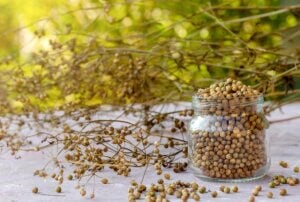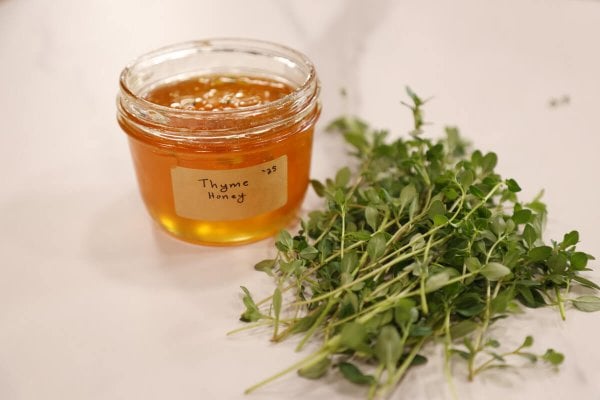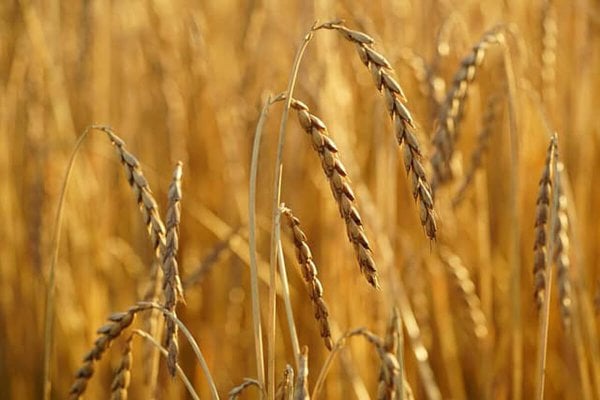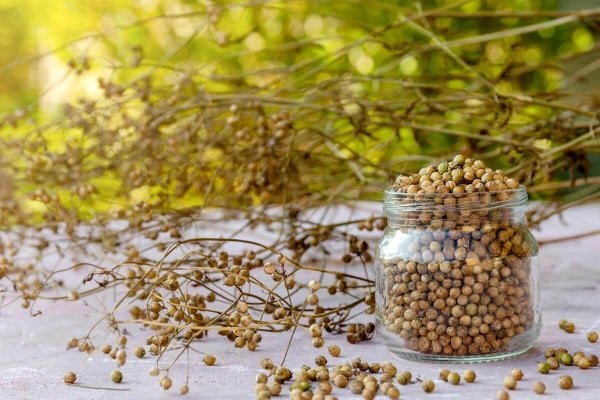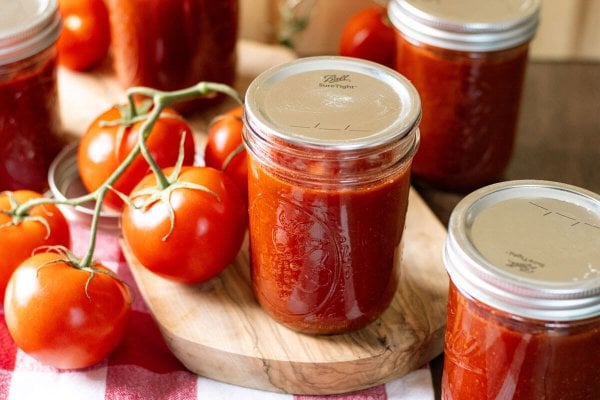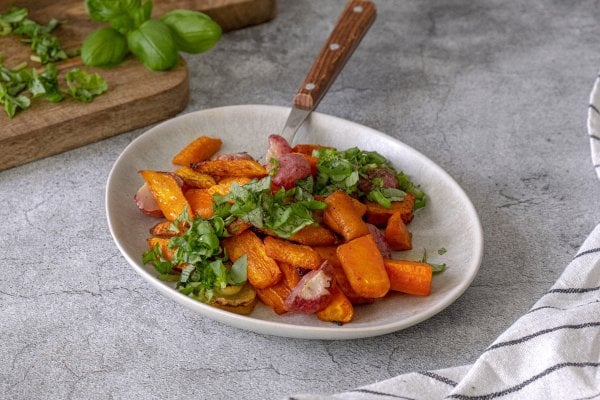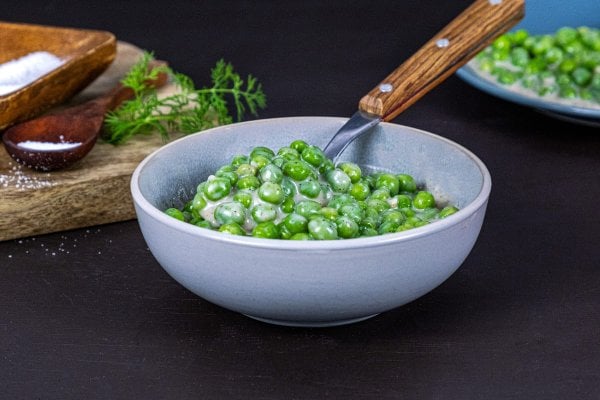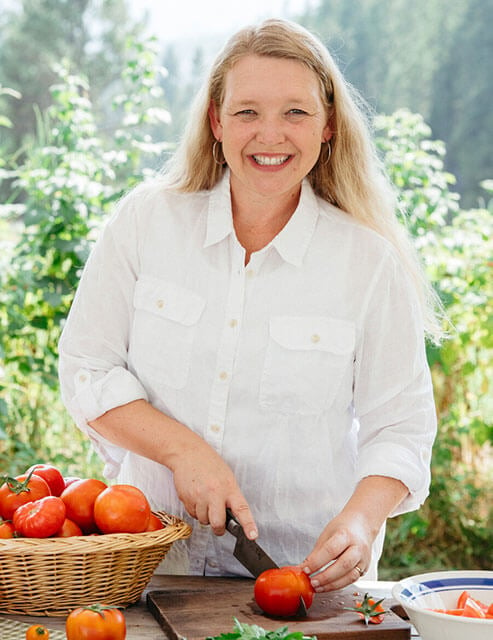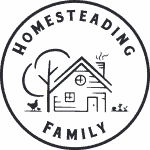We say it every year, but Thanksgiving is our favorite holiday and our favorite time of year. From preparing everything for winter to turning our focus more inside, it’s a season of slowing down, being intentional and filled with thankfulness.

In this year’s Thanksgiving episode of the Pantry Chat Podcast, we’re sharing many of the things we’re thankful for, including each other, our children, community and even technology!
Links Mentioned
- Homemade Pumpkin Puree
- How to Can Pumpkin & Squash
- Preparing the Homestead for Winter
- Stocking the Barns for Winter
- Preparing the Garden for Winter
- Wintertime on the Homestead

Holiday Recipes & Crafts You May Enjoy
- Spatchcock Turkey: The Ultimate Thanksgiving Hack
- Chestnut Stuffing: A Savory Holiday Favorite
- Nantucket Cranberry Pie
- Homemade Pumpkin Pie
- Fermented Cranberry Sauce
- Fruitcake Cookies Recipe (A Holiday Classic Treat)
- Aged Eggnog
- Homemade Sparkling Cider
- Homemade Holiday Wreath
- Homemade Stovetop Potpourri
- Homesteading Family’s Favorite Gift Guide
If you’re still in the holiday spirit, you can watch or listen to a past episode of the Pantry Chat where we shared about our Thanksgiving traditions and how to enjoy a stress-free holiday season.
In this Episode
- Our favorite favorite holiday recipes, as well as Carolyn’s “go-to” pie crust.
- Why Thanksgiving is our favorite holiday.
- Why sharing and giving thanks is so important this time of year.
- Explaining “Mayflower Night” and some of the other family traditions that we have every Thanksgiving.
- Why it’s OK to have pie for breakfast (Josh has a good reason!).
- What is on the menu for Thanksgiving?
- How we plan our Thanksgiving day by going backward!
- The importance of having extra butter on hand.
- What we do for dinner and breakfast leading up to Thanksgiving.
- Why BYOD (bring your own dishes) is a great alternative for reducing waste.
- Find someone you can bless and invite them to dinner this year.
Josh: Hey, this is Josh.
Carolyn: And Carolyn.
Josh: With Homesteading Family and welcome to this week's episode of the Pantry Chat, Food for Thought.
Carolyn: This week we're talking about thankfulness on the homestead. A apt topic for the moment.
Josh: Thanksgiving weekend, and we hope you all are having a fantastic and thankful weekend.
Carolyn: Yes, absolutely. We'll get into the actual topic in a few minutes. So if you guys are new to The Pantry Chat, I see we've got a lot of new people joining us on The Pantry Chat. It's in podcast form. It's actually growing really quickly, which is...
Josh: Awesome.
Carolyn: ... really cool.
Josh: Thank you.
Carolyn: Thanks for joining us.
Josh: Thanks you all guys.
Carolyn: But if you're brand new, just know we do some chitchat upfront and if you want to skip ahead to the main topic, it will be timestamped for you over in the show notes. You'll have to click on the link to get to the show notes and it'll be timestamped for you and then you can just skip right ahead.
Josh: But you don't want to miss the chitchat. It's fun.
Carolyn: Chitchat's the best part, really.
Josh: Alrighty, so chitchat, we're going to answer a few subscriber questions as well. We're going to do a few extra today and then talk about a little tradition and thankfulness.
Carolyn: Yeah.
Josh: Pretty cool. So what's up with you?
Carolyn: What's going on on the homestead. Right now, we are freezing. Literally everything is frozen.
Josh: It got cold.
Carolyn: We are officially, I think the last time we talked it maybe had not quite frozen yet. We were like right on the edge.
Josh: Came later this year.
Carolyn: It did.
Josh: Really came quite a bit later than normal, which was nice.
Carolyn: It's always nice on the preserving side. It gives you a little more time to get a little bit more out of the garden.
Josh: Got more tomatoes in this year.
Carolyn: Yeah, absolutely. But now we are officially hitting lows down in the 20s. Wouldn't be surprised to see lower than that here in the next couple of weeks. Usually, November we see some of our low, low temperatures. We always like it when we get snow first, so it mulches the ground and doesn't harm the perennial plants as much.
Josh: Yeah.
Carolyn: But we'll see if that happens this year.
Josh: Well, we've gotten a lot of rain, which I love it when we get a good amount of rain in late fall, pre-freeze. It gets the soil saturated a little bit before it freezes.
Carolyn: Yeah, which really helps us out in the spring.
Josh: It really seems to, seems to give it a boost.
Carolyn: Yeah, definitely. So right now we're pretty much pulled in. We're pulled inside for the most part as far as gardens go and as far as what I'm handling. We did harvest a little bit more kale the other day. I think we might get a few more harvests. We've got some of the Russian kale is really hardy. It'll really go a long ways. The Lacinato kale, am I saying that right? Lacitino, Lacatino?
Josh: You're the kale eater. I have no idea.
Carolyn: That goes for a long time into the cold. And we have one variety called a Tronchuda kale that we grow. And it actually has a more tender leaf and it's chugging right along through the cold. So I think we can get maybe one or two more meals off of what's out there before it just gets too cold. But we'll see. There's not a lot left. So that means most of my focus is coming inside. We've got the school year seriously underway. Everybody's buckling down, really getting a lot done. And then we're dealing with some of the inside produce, the stuff that comes inside and sits. So we've got pumpkins, winter squash, lots of winter squash. We're kind of focusing on those right now. Some varieties of winter squash only really get you through until about Christmas in our area.
Josh: Well, especially in our storage, we're still working on ideal cellar storage that would stretch that with proper temperatures and humidity. So they're in the house.
Carolyn: Which works for us for a long time. Other varieties will get you all the way through spring, even in the house. They'll really last a long time. But you've got to pay attention to the things you brought in and get them turned into something else somewhere along the way if they start to get soft. So we're watching the pumpkins and the Delicata squash is one that doesn't go as far. And eating them and turning them into other things.
Josh: How has your experiment gone with leaving the skin on and preserving, free strain, using, can you speak to that yet?
Carolyn: I can't. Actually, I can't give you a final decisive.
Josh: But you're still working it out.
Carolyn: I can tell you guys what I'm experimenting with, and that is that I have heard that winter squash skin is completely edible. We know this because summer squash skin is edible and they're not really different kinds of squash, they're just bred for different things.
Josh: But it's a harder skin than a summer squash. So that would be perception-wise.
Carolyn: Only because it's older. And more mature.
Josh: Because it's older, it's more mature. It's that skin hardens off.
Carolyn: So if you left zucchini on the plant long enough, it would get the same type of hard skin, and if you cured it would do the same thing. It just might not have a meat that you would want.
Josh: Yeah, I would guess that meat's not going to last.
Carolyn: Not as well, or it's going to get hard and mushy and do different things. More like a pumpkin. But so we know that it's completely edible. So this year I am trying something, which is doing the normal cooking method of the pumpkin. I actually have a video on that if you want to learn how to do that. But then instead of taking the skin off, I'm leaving the skin on and I am blending it all up with the pumpkin. Obviously this requires a food processor or a blender or something to make it nice and small. And then I'm freeze-drying it. Which I've started going to freeze-drying most of the squash before we eat it, just because you can powder it and you can get it silky smooth when you rehydrate it. Which for a side dish for dinner, a savory, that's not a big deal, but if you want it for pie, being able to have that pie that is completely silky smooth.
Josh: Makes a good, good pie.
Carolyn: That's really good. So I've heard that doing this just intensifies the pumpkin flavor and the nutrition and the good fiber. So we're trying it, we're going to see what we get. But we have it freeze-dried, but we haven't tried tasting it yet.
Josh: Haven't used it yet.
Carolyn: We haven't used it yet.
Josh: Well, and there's another way to extend the use of pumpkins if you want pumpkin throughout the year because usually we don't preserve them a whole lot of other ways and I think... Can you can them?
Carolyn: Oh, you can can them. You can pressure-can them in chunks. You can't can them pureed.
Josh: Yeah, and of course that seems to always take it another direction.
Carolyn: Yeah, it's not our favorite.
Josh: It's not as good.
Carolyn: You can freeze them. But it requires freezer space.
Josh: Yeah, so this is a really nice option.
Carolyn: Yeah, we're excited about this.
Josh: Very cool.
Carolyn: Yeah.
Josh: Good.
Carolyn: Good. All right, so those are the things I'm up to. Lots of stuff around here.
Josh: Very cool.
Carolyn: Filling the cheese cave. It's pretty full.
Josh: It is. The cheese cave is-
Carolyn: We're about to slow down.
Josh: ... looking good and we're slowing down on cheese. We're moving towards drying off the cow or not drying her off, but taking her down to once a day milking here for a few months.
Carolyn: Which will really slow down the cheese making. That really gets us into being able to just have fresh milk and yogurt type of, maybe a little bit of fresh cheese. But yeah, so that's good. So that's what I'm up to. What about you?
Josh: Well, I am presently wrapping up the outside of the property, getting ready for winter. Hopefully by the time you're seeing this, we're done. My goal is always Thanksgiving to have everything outside pretty much shut down and into winter mode, which means temporary fencing in, hay, wood shavings in for the barn, which that's almost wood shavings and hay is all in. Temporary fencing is coming down. Most of the animals in except for the beef cows.
We'll push them a little bit longer until the snow gets deep, and feed them out on the field even when it gets a little bit deeper. So really just wrapping up and getting into winter mode. Wrapping up some projects. The barn has been a multi-year project. I'm hoping to wrap up next year and kind have it in its pretty close to permanent form.
Carolyn: That's exciting.
Josh: So we've got a few details we have to wrap up here in order to have all the animals organized how we want them. This year we've got more animals going on than we've ever had. We've added goats to the farm. And we're planning to breed and I guess kid those, we'll have some kids later this winter along with some lambs and some calves. So kind of just getting all ready for that and get buttoned down so that we can go into a winter mode. Which really does on the outside ease up if we have our chores organized, everything's consolidated, and it's mostly just managing feed and manure for the winter.
Carolyn: That's good. This is Josh's special permaculture barn. It's got a lot of really cool features to it that hopefully are helping make managing the barn a lot easier with the animals.
Josh: It's getting better every year. It's a bit of an experiment. Applying movement. Some of Joel Salatin's deep bedding methods and just applying these things to our situation and our environment. Which we pretty much got to be in the barn five months of the year. My goal is to get it down to four, and get better at stockpiling feed, pushing animals through, but we're not there. We're between six and seven right now.
Carolyn: For those of you guys who don't know. We are in the very far north of Idaho and we have a lot of winter around here.
Josh: We do. So yeah, that's just getting ready for winter and it's going good.
Carolyn: What about hunting? It is hunting season.
Josh: It's hunting season. So I'm not getting out as much as I would. I got out the other day and missed a chance at a nice buck. Missed a whole lot of does, and so hopefully this weekend.
Carolyn: Hopefully.
Josh: Getting a little more opportunity to get out there and get a little venison in.
Carolyn: So far we've gotten one buck and an elk into... Our sons have gotten out.
Josh: Yeah, the boys.
Carolyn: They've been able to get those.
Josh: So we got a little red meat in the freezer and butchering should be all done here too. Which we are outsourcing this year. We were going to do a little more in-house, but things get busy and it's good to remember as homesteaders we often want to do it all and it's definitely good. We need to know how to do these things, but sometimes you got to choose your battles. This year there's just so much going on that we just decided to go ahead and outsource all of the butchery besides the chickens and turkeys. And so those guys are hanging. We're waiting to get them back.
Carolyn: All right.
Josh: Yep.
Carolyn: Sounds good.
Josh: So good stuff. Rolling along. Very, very thankful for the year and where we're at.
Carolyn: It's fun being on, and this kind of leads into the thankful Thanksgiving idea, thankfulness. It's always exciting to be on the inside of the harvest season. We just look around and there are piles of winter squash up in our dining room, literally. Like piles of it. And the cheese cave, I'm looking at what, 12 wheels of cheese sitting right here off-screen. And the pantry is completely filled with jars. Between canned foods and fermented foods.
And it's really exciting bringing in all the meat, the freezers are filling all up, and that's a big deal, you guys. It's good to take a moment and really dwell on that. And just that's a lot of hard work. That's a lot of give yourself a pat on the back for doing it, but also just so much to be thankful for.
Josh: And remember sometimes having that food on hand is better than cash in the bank. Oh, I'm reading Joel Salatin's new book, Homestead Tsunami. If you guys haven't gotten that, I really want to encourage you to get that. Very, very cool. But he was talking about this and he was referencing Dave Ramsey, and this is kind of a standard financial recommendation to have six months of cash on hand, which backup emergency, whatever, and good recommendation. But part of the thought there was maybe it's better. Not that you don't want to do that, but it's better to have that much food on hand and as a backup. And not just for winter, but just for any time of the year in these increasing times of you don't know what's coming next.
Carolyn: And inflation, let's be serious. Food's getting expensive. I went to the grocery store the other day for just a few things for a potluck and I had one bag of food coming out of there and it was almost $100. I was blown away. I just gotten a little lost on grocery store prices just because we do so much from right here. But I was blown away. I was actually kind of horrified and thinking that, gosh, if we were going to the grocery store for most of our food, I don't know what we'd be making some serious budget cuts. So I'm really thankful that we are growing as much as we are.
Josh: Yep, absolutely. All right, you want to tackle some questions?
Carolyn: Let's dive into some questions.
Josh: Okay. I guess I think this first one here is for you from Taylor on Facebook. Do you have a Pantry Chat episode about how to move jars? I'm about to move over 1,000 miles and not sure how best to move all of our preserved food. Wow. Well, we've done that a few times.
Carolyn: We have done that a few times. I don't think we have an actual Pantry Chat on how to move jars. I think we've talked about it a few times. But we've moved across country 1, 2, 3, 4, 5 times at least that I can think of with jars of food, with a lot of jars of food. And first of all, I got to tell you, if you have jars of food, canned jars of food that have been properly sealed, they are way more stable than you think they are. In all those moves, we've had a few jars break, but I don't think I've had almost anything come unsealed ever.
And so that was a surprise to me the first few times I moved. I really thought that those seals were maybe not as strong as I thought. The really important thing with it is watch the temperature fluctuation the best you can. I think about temperature fluctuation when you're in the move. You don't want your jars of canned food to freeze. That will ruin your seal. You will lose your seal. And of course you don't want to get super-hot storage container on a hot road on a hot day sort of a thing. You really don't want that because you can loose seals that way. But aside from that, if you just pack them really tightly into a box, it is probably going to be just fine.
Josh: If you can get, and they're hard to come by, if you can get the actual boxes that they used to come in. We've been places where we could actually get the boxes with little cardboard dividers, they're fine just going in that. If you can't, you got to put them in a regular box and just pad them with some newspaper or a little bit of filler or something.
Carolyn: I have, for one move, I did go to Uline and I bought the little dividers for them, but since I've now moved other times without them, and I've found that you just don't need them. That just packing them tightly into a box is going to do really well.
Josh: And a little strategy. If you are having to move during weather changes or like you're moving from one climate to another, and you're going to experience some weather change in that move that happens. If you're loading your truck, you probably have a U-Haul or moving truck. Put those things in the center somewhere if you can. So that you have other things on the outside of the truck. It's going to give you insulation, right? It's going to buffer it. If you are having to go from say the south and you're going to the north and you're moving in November or December, then just pack those inside, not on the edges, but on the inside of the truck. And that's going to help protect that from that temperature change. Buffer it.
Carolyn: Let's see. I think most of these are questions for me today.
Josh: Yeah, that's what it's looking like here. Kelly Cooper on the best herbs to use in an emergency. Can salves be stored in BPA-free tinted plastic jars or do you recommend glass?
Carolyn: Okay, so I generally recommend glass or if you can get the good quality little stainless steel tins, that's another good thing to put them in. If you feel like you need to put them in plastic, I think the thing to realize is just because something's BPA doesn't mean it's okay for you. They've changed to some of the other types of plastic that are actually just as bad for you. I think there's BPE and BPS are kind of what they just shifted to. Because the public got all worried about BPA. And they have just as many health problems with them. So BPA is a step, maybe, not really. It's awareness for the public, so that's good. But your best answer is just to stay away from plastic. However, your salves are not acidic. They should be okay in a plastic if you feel like you need to go that way.
Josh: I think a good rule of thumb for this, and a lot of things too, just from the big picture is we're always striving for the ideal, but as homesteaders, we also need to use what we have and be okay that it's not always ideal. Better to have a good homemade salve, something you like, to be able to solve problems at home without going to the doctor right away, in a less desirable container than the ideal container. Then eventually, hopefully we get to the ideal.
Carolyn: Absolutely. Good thought.
Josh: Let's see here. CNSteph2 on throw away your condensed cream soup cans, asks, can you just freeze dry the fresh stuff and rehydrate it later for use?
Carolyn: Yes, you can. If you have a freeze dryer, you can absolutely just make up the fresh version of quick soup, a cream of whatever soup, and then freeze-dry it. Just know that it does have some amount of fat in it. So you're probably talking, you don't want to store it for much more than probably, I'm going to guess about three months is really what I'm going to say. So it's not really a long-term storage item because that fat just doesn't, it still stays fat. It's still fat. So even after being freeze-dried, which is going to go rancid.
So as long as you use it quickly, absolutely. If you want to extend the life, store it in the freezer in your Mylar bags or in a airtight jar, making sure that you let it come to room temperature before you open the container so you don't get condensation inside. But yeah, the fresh stuff, the flavor is through the roof better than the shelf-stable powdered stuff.
Josh: Yeah. Very cool.
Carolyn: Yeah, even the homemade versions. So this one is one for you. Okay. Homesteading Crazy on Homesteading Resilience videos asks, do you use your fruit tree trimmings? Do you smoke meats? So just wondering. You do smoke meats, so just wondering.
Josh: Yes. So we do smoke meats with it and apple is great. Fantastic for that. Now you only need so much. Eventually we're going to have a larger smokehouse. We have the beginnings of it, probably take a couple of years to finish it and we'll be able to use a lot more. So definitely apple for smoking bacon or any meats is wonderful. But you can only use so much of that. So it kind of depends.
Now we just planted a whole lot of fruit trees and we have some older ones. I'm always trying to minimize trimming the trees. I'm trying to shape them so I don't have to trim them every single year. That is a lot of work. I'd rather have more fruit trees and less trimming and get more fruit from more trees. But when you're trimming them, the other thing to do with them besides smoking that I like, primarily is just chipping them and using them.
We have no lack of need for wood chips on the homestead for building soil, managing manure, filling pathways. So chipping is really the next option. I think you could probably get some creative with some arts and some other things for uses. But depending on your fruit trees, they're not always the straightest, most user-friendly branches really. In general, regular printing. My tongue feels thick today.
Carolyn: Pruning?
Josh: Pruning, yeah, pruning. Maybe my brain is thick.
Carolyn: But you're bringing up a really important idea here. And we are playing always with ways to make what we're doing on the homestead more efficient and easier year after year. And if you want a highly productive single tree, the advice out there is prune, prune, prune.
Josh: Which I would say if you're in small scale and you need to maximize production and you only got a couple trees, then there's definitely very, very good reasons for very strategic pruning.
Carolyn: Absolutely. But we also know if driving around here, there's some old trees that are totally abandoned and forgotten about. Apple trees.
Josh: For many decades.
Carolyn: Have not been pruned aside from winter storms. And they're still very productive. Now, maybe not as productive, but still very productive.
Josh: We've got one on the farm and it is very productive.
Carolyn: It's maybe 80-year-old tree, huge old apple tree. We've not really done very much to it. It's gotten pruned in storms, but still very productive. So the other side of that equation is if you have space for a few apple trees, you don't need a few more trees. You don't need such a high yield off of each tree and you don't want to do as much work, shape them right when they're young so that you can maybe not do all that work and get all of those prunings.
Josh: Well and think about aging as well. And we get a lot of questions about aging on the homestead. You want to reduce your work.
Carolyn: It's a good method.
Josh: You don't want 10 trees that you've got to prune every year. Right. Thankfulness on the homestead.
Carolyn: Let's talk about Thanksgiving for a second first and what we're doing and what, by the time you guys see this, you will have hopefully had a wonderful Thanksgiving.
Josh: And hopefully we have too.
Carolyn: And hopefully we have too.
Josh: We're assuming so.
Carolyn: We haven't had it yet. So we'll talk about plans and just real quickly, a few family traditions. And some of the things that we do to remember thankfulness.
Josh: Absolutely. It is my favorite time of the year. It's my favorite holiday. And I guess a lot of that's because nobody's figured out how to commercialize it very well yet. It just still seems humble. It's family, it's good food.
Carolyn: And what gets better than that?
Josh: Yeah, and good friends usually, because we usually leave a few seats at the table for some guests. And plus we get to have some other fun like shooting guns and blowing stuff up and bonfires.
Carolyn: There's always fun stuff going on Thanksgiving weekend. We don't tend to, I know a lot of people decorate for Christmas right on Thanksgiving weekend. We don't really do that. And I think between it being one of Josh's favorite seasons with the Thanksgiving time, it's one of my favorite seasons. Fall is just altogether my favorite season. I love the decorations. I leave the decorations up as long as I can. I love the colors of the trees and the crispness of the air and the bonfire, all of it. So we're not in a big hurry to transition to winter decorations around here.
Josh: It's also usually the last few days of hunting season.
Carolyn: It's usually the last day of hunting season.
Josh: And it's usually the best time of hunting season in our area. The bucks are in rut, they're moving the most, and so I've found that I'm the most successful. So usually there's still a couple of us hunting.
Carolyn: Which with as many hunters as we have, and huntresses, as we have in the house at this point, that's a big consideration for the household. So we usually leave that off, but we do have time and room for some other fun things. So Thanksgiving, we've talked before about some of our standard Thanksgiving traditions of the special tablecloth that's embroidered, and everybody leaves their notes on it. The pie for breakfast every day afterwards until we run out of pie.
Josh: Love it. I love it.
Carolyn: All those good things. The one time a year you can just eat, it's kind of fun.
Josh: Not great for the waistline. I find that I eat a lot of pie and I sit in the tree stand.
Carolyn: Well, it's cold out. You got to have some calories to burn on the cold. I'll help you justify it if you need it.
Josh: Good, thank you.
Carolyn: But then there's other fun things we do. And one of them is every afternoon on Thanksgiving after we have had a meal together.
Josh: Before dessert.
Carolyn: Before dessert, because you know you're full, you got to make room for all those amazing desserts. We go out and we all shoot together as a family.
Josh: We do. Usually pistols. It started with pistols, usually do some pistol target shooting. I think we're going to do a little competition this year it seems like. Kids are getting older, and they created a shooting tree.
Carolyn: Oh, yes. This is a lot of fun. It's a dueling tree is what they call it.
Josh: A dueling tree. Right. A dueling tree.
Carolyn: So two people are shooting to the same target that swings.
Josh: They're on each side and you knock them one way or the other.
Carolyn: So you try to get all the targets to the other person's side so that you can win.
Josh: You've got whatever your shots are in your pistol. We're in Idaho, so we get more than 10, thankfully. Usually it's like 15 or so. And so you see who can get the most on one side or the other with using a round. So that's always a fun little competition.
Carolyn: It's always a fun time for the little kids to get out and maybe shoot a .22 for a few minutes and aim at a few things. We tend to do that a little bit. And so it's just kind of a family fun moment where we all get to have a good time.
Josh: It really is.
Carolyn: Yeah, we do that.
Josh: I like blowing up the pumpkins. That's fun too.
Carolyn: We blow up a few pumpkins. You got to save the pumpkins that aren't doing well.
Josh: Got to have a couple. Fill them up with Tannerite. Just saying.
Carolyn: For those of you guys who don't know what Tannerite is, it's a small explosive that is just made for being aimed at and shot.
Josh: It doesn't do a big fire explosion. And here it's ready, we can buy it. We can buy it at the sporting good store. I know some places you probably don't have access to that, but a lot of places you do and it's fun. I don't know.
Carolyn: It kind of sounds like a cannon going off in your front yard.
Josh: It does. We had neighbors when we first moved up here, and I feel like that was Thanksgiving weekend. I don't remember. But all of a sudden it sounded like the Civil War down in the valley below us and we didn't know. We did not know about Tannerite. We weren't familiar with it. And we were like, what in the world are they, they must really have cannons that they're shooting. And we learned later what they were doing.
Carolyn: Yeah, absolutely.
Josh: So we have a little fun with that now.
Carolyn: So anyways, that's always a really fun thing that we do in the afternoon. It's a great way to get out of the kitchen for a few minutes, get a few fresh breaths of air before the sun goes down. It gets dark, which of course happens so early here this time of year, it's like 4:00 and it's getting dark already. Somewhere in there, 4:30. And then we get into the house for our pie and dessert and some fun fellowship after that. Usually a lot of games and different things like that.
Josh: Yeah. One other one that leads into the subject that we do is we always take time around the table with everybody sitting to everybody take a turn to talk about one thing that they're thankful for. And something we do around the table. Usually dinner time. Maybe sometimes it's dessert, but usually it's dinner.
Carolyn: Usually it's dinner.
Josh: While we're still collected. And so we wanted to take a few minutes to just bring that tradition to you and talk a little bit about a few of the things that we're thankful for.
Carolyn: We're going to actually dive into what we're thankful for, but I've got to say it's so important to take a moment and do this. I know we have this date on the calendar. That's great. It helps us remember to actually take a minute and think about what we're thankful for and think about what we're grateful for. But it's so good to do this collectively as a family. When you're sitting around with friends. If you're out at a dinner with a bunch of friends, throw the question out there, what are you most thankful for?
And keep this conversation going, not just now, but throughout the year because it's so easy to get focused on what's going wrong, what's in the news, what problem you're trying to solve, the challenges at work or school or wherever it is you are. It's so easy to get focused on that. And it's just so good for our morale, for our joyfulness, just for our spirits to take a moment and just think about what we're thankful for and grateful for.
Josh: It really is. And there is always, we have a sign on the wall by the front door that says there is always, always, always, always something to be thankful for. And there really is, no matter what we're going through, there really is. So what is something you are thankful for?
Carolyn: Oh, we're in a season right now where we've got, the oldest kids are still all here. But they're about to start leaving. We've got one getting married in January. We've got one looking at going out to some mission trips starting next summer. We've got another one coming behind, thinking about leaving for an internship somewhere possibly. And so I am having a moment of feeling really thankful that we are still gathering with all of us around the table for dinners during the week, for Thanksgiving meals, for all of it.
But that every night we go to bed and all of the kids are still in the house and it's like, I don't need to wonder where they are. Are they safe? Is everything okay? They're just right there. So I'm really thankful for that, the end of this short season. So that's wonderful.
Josh: That was a good, good thought.
Carolyn: What about you?
Josh: One I've been thinking about is just being thankful for our country, for this land we live in. I spend a lot of time frustrated with the realities of the world, of a lot of things. And we spend other times talking about that, but we still live in a wonderful, wonderful place. We gather around our tables every day. We express our faith, our beliefs and freedom without fear, and generally get to move about freely. And I just really trying to hold on to that this time of year. And thankful for the place that we live and the freedoms that we have to live the life that we choose.
Because we can still choose. We can choose to live this homesteading life. We can choose to break free from systems that we don't like. And not everybody in every place has that freedom even. So I'm very thankful to be able to craft, to have the freedom to craft the life that we want. We can choose to do that. Not really that many constraints on us if we want to choose to chart our path.
Carolyn: Yeah, that's pretty neat. I like that. Something that I'm thankful for that we don't really, I don't know. Our lives are so centered around it, but we don't really talk about it in this way. But I'm thankful for, the resurgence of interest in traditional things and traditional skills. Obviously you guys see all that we do. We really passionately believe in the value of homesteading and of living a life based around some traditional skills.
Traditional meaning traditional in the modern sense of not having to do it all by hand without electricity or anything like that. But so I'm so thankful the more and more people that I see that are stepping into this life and reconnecting with some of those things. I think it is something that makes our nation more secure, our communities, our world more secure and just even more connected. Like more time spent together, working together, less time on a device, more time with real skill.
We were talking today about the stories we've heard of children who don't actually know where their food is coming from. Literally not realizing that-
Josh: The chicken in the store comes from-
Carolyn: The chicken and the chicken are the same thing.
Josh: From the chicken they've seen out in their neighbor's yard or wherever. Not even knowing that connection. That's like, whoa.
Carolyn: Yeah, and that's gone back a long time. My mom used to talk about growing a small garden in the city, and pulling a carrot out, and all the kids standing around would be like, "Oh my gosh, that's so gross. I'm never eating a carrot again. I didn't know it came out of the dirt." And so that's gone on a long time. But I'm so thankful for the resurgence of interest and the people, you guys, that are actually changing your lives and doing these things and keeping these skills alive so that our next generation has access to them.
Josh: Yeah, I'd love to just build on that thought, and I put those in the terms of agrarian living and an agrarian life.
Carolyn: Yeah that's a good way to put it.
Josh: That's very, very important. There's a lot of economy. There's a lot of pieces that go into agrarian living. And thankful for you guys in two ways. And one is obviously we're here getting to do this, and this provides for us, it allows us to live the life that we want to live. But I truly believe that this is a good, right way to live. And to see more and more people embracing these skills, this agrarian way of living in some form or another, wherever you're at, to see more and more of you embracing these skills.
To me, that's just good for our people, for our culture, for our society. And I'm thankful to see it's growing. More and more people are getting interested in realizing there's value in this life. And it's hard. It's not an easy thing to do. You got to give up a lot of the convenience, a lot of the simple pleasures to live this life, to have room to live this kind of life. And more and more of you are doing that. And I'm thankful for that because that's a good thing, not just for the individual, not just for the family, but it's a really, really good thing for our culture.
Carolyn: Yeah, absolutely. For me, this is one that I spend a lot of time frustrated over. You were talking about that with the news and maybe the country and the current, it's so easy to be always upset with this thing. And yet it's something we should be so thankful for in many ways. And that's technology. And that may seem so opposite what we usually stand for of those traditional skills, but I'm so thankful that I can turn my blender on or my food... You guys know if you've watched me very long, I am in love with my food processor with the dicing kit. I love that thing.
When I found out that that thing existed and I got it, I think I'm still as happy today with that thing as I was back then. I just love it. I'm so thankful for it. But I'm also thankful for the opportunity that we all have to learn from each other because of it. Here in this platform, whether it's podcasts or whether you're listening through a podcast or on YouTube or wherever it is.
There's obviously so many challenges and so many problems with technology and the way we apply it. And yet there's also so much that we've gained from it. I've learned so much. Oh my goodness. I don't think we could be where we're at today without the ability to do the research or to watch what other people are learning. It's a good thing. So I'm going to take a moment to not be frustrated with it and be thankful for what it's done for our culture.
Josh: It's a good tool in this time and season.
Carolyn: It's a good tool. Put it down occasionally too. It will be a better tool.
Josh: Well, and know that we may not always have it in this way. I think that's a good reality. We're leveraging something that we have right now, just like that blender. It makes it doable now. Knowing how to get by without the blender, because there may be a time where power is more scarce or a variety of things. It's the same with technology.
Carolyn: Absolutely.
Josh: So it's a great tool right now. Let's be thankful for it and use it, but be prepared to-
Carolyn: Live without it?
Josh: Live without it, yeah. Stuff.
Carolyn: Practice living without it occasionally too.
Josh: Yeah. Right. Yeah. Flex your muscles in other ways.
Carolyn: Yeah. Sounds good.
Josh: Oh, I got to just add that I'm thankful for Jesus Christ. For the hope that my faith brings that to get through the now, to think about the eternal, and know that there's something beyond everything that we do and struggle with now. That that just gives peace and security and hope through all circumstances and all situations. So very thankful for Jesus Christ and what He's done for each and every one of us.
Carolyn: Oh yeah, absolutely on that one. And to know when you wake up every morning that you have help by your side, you have something to be joyful about. Something to hold onto that just in a world that's this crazy-feeling as ours is starting to feel, that's important, and that is something we can all be thankful for.
Josh: Well, and to know that there is truth. I like to tell the kids sometimes gravity, you know gravity works. If I pick this cup up and drop it, something's going to happen. You can guarantee that. And so much of the world is telling us that there is no truth. There is no solid thing to know or believe. And I believe that's false. That there is ultimate truth and real truth in reality, and we can depend on that. And to me, that's scary without that.
Carolyn: The world is. The world's a pretty crazy place.
Josh: It really is.
Carolyn: Good.
Josh: One more for each of us.
Carolyn: Okay. One more for each of us. Okay. I'm trying to think of a meaningful, there's so many, right? That it's hard to throw out a meaningful, I am thankful for community. I'm going to say that. Because that one is really meaningful for us. We've lived in a lot of places where we did not feel part of a community. Even though we tried, even though we tried putting ourselves out there and making connections and getting to know people.
And so I'm thankful that we finally found a place where we have community. I'm hopeful that you guys all have found that place where you have a good, strong community and people around you that support you, whether it's family, an extended family, or it's friends, or hopefully you have both. But here, we're blessed to have a lot of friends who are like-minded, and I'm just so thankful for that.
Josh: Very cool. Absolutely. Well, I'm going to be deep and cheesy at the same time and embarrass you.
Carolyn: Oh, dear.
Josh: I'm thankful for you.
Carolyn: Well, that's nice.
Josh: You are awesome. You are an amazing wife, an amazing mom.
Carolyn: You are going to embarrass me.
Josh: Good. Trying to.
Carolyn: That's nice. Thank you.
Josh: But I'm very, very thankful for you, and thankful for the life that we have and the family that we have, and that we get to do this together. It's amazing. You are amazing.
Carolyn: Thank you.
Josh: There you go. Be thankful for the people in your lives. We hope you are having a fantastic weekend. Enjoy it. Go deep, but have some fun too. And we will see you soon. Bye.
Carolyn: And I'm thankful for you too.
Josh: Thanks for listening to this episode of The Pantry Chat, Food For Thought. If you've enjoyed this episode, please subscribe, rate and review.
Carolyn: To view the show notes and any other resources mentioned on this episode, you can learn more at homesteadingfamily.com/podcast.
Josh: We'll see you soon.
Carolyn: Goodbye.
Sign up to receive email updates
Enter your name and email address below and I'll send you periodic updates about the podcast.




